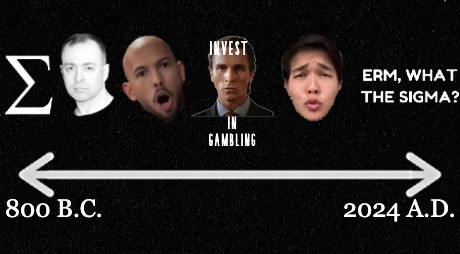You should turn away. What lies ahead is the chronicle of one of the most infamous, reviled words in human linguistic history. It invaded the web on the millenia’s turn. Since then, it has passed through the hands of most every faction — Insecure Teenagers, Twitter Users (there’s overlap), and the Modern-Day Brainrotters. So click the back button, flip the page, or douse whatever you’re reading this article on with holy water if you’re not ready. Otherwise, allow us to plunge into the depths of this cycle’s Wonder-Word: sigma.
Sigma, as it was originally conceived as part of the Greek alphabet, likely came into existence around 800 B.C. About 3 millenia later, sigma is known as a face of Gen Zalpha brainrot. It’s used almost exclusively ironically. Phrases like “What the sigma” and the sigma wolf motif pervade many reels and TikToks. And yet, sigma wasn’t always confined to memetic irony.
The concept of the “sigma male” likely originates from Theodore Robert Beale’s Vox Popoli blog. On a May 26, 2010 post titled “Explaining sigma. Again.” Beale describes the sigma male as “outsiders who don’t play the social game and manage to win at it anyhow.”
Beale describes many foundational aspects of the sigma: the idea of a “social game” one can win, of being an “outsider” removed from mainstream society and culture. And of course, the application of an alpha-beta hierarchy — popularized by primatologist Frans De Waal — to human society.
Sigma initially crept slowly across the internet. In coming years, the term permeated small forums, Facebook posts, and niche articles. These smaller pieces would often introduce the term to readers as a personality to strive for, emphasizing being a lone wolf and picking up women. A book released on April 1, 2014 even claimed becoming a sigma was the solution to “marital strife” (though its advice’s sincerity is questionable, given its release date).
The ideas behind the sigma male were much popularized in 2016, with the explosive rise of Andrew Tate. Tate’s growing social media presence was defined in part by his “self-help” advice for men. He emphasized hustling and independence from society, making claims like, “you’re in competition with the entire world” which line up with the sigma male archetype.
Tate’s popularity, as well as those of similar figures like Jordan Peterson, also coincided with the rise of problematic aspects of the sigma male. Falling in with the term’s implications of “getting” women as a bar for success, Tate has claimed that women are their husbands’ “property,” and, according to BBC, has avowed himself a “misogynist.”
But even as sigma male was being popularized, cracks were showing. Disagreements have long been present regarding what a sigma male is. On the 2010 blog, Beale himself expressed frustration with people not understanding what a sigma is. De Waal, who popularized alpha-beta terminology, turned on the use of his theory in 2018 by claiming that people were misusing terms like “alpha male.”
And then came the memes. It began innocently in 2021, when the sigma male was re-exposed to the mainstream in a tweet by @LilySimpson1312. The tweet and its responses mocked the excessive classifications of sigma male and similar terms. In part, the jokes about sigma male were familiar, if more widespread than they had been in the past.
But this time, something caught. In the inexplicable rhythms of meme culture, the internet decided to latch on to mockery of sigma, parodying popular entrepreneurial reels which spawned from sigma culture. These would often use fictional characters regarded as “sigma” by users of the term (a notorious example being American Psycho’s Patrick Bateman), and overlay edits of them with intentionally nonsensical financial advice.
Around this time, the idolization of these characters also came into the memetic spotlight, with the phrase “literally me” popping up in mockery of those who sought to imitate their “sigma” qualities.
Another early meme around sigma male was the “sigma face” trend in 2022, a prototypical strain of what would evolve more recently into “mogging” and “mewing.” Again, the desire to imitate “sigma behavior” was the object of derision, with people copying an expression made by Patrick Bateman.
Sigma now received widespread mockery. But so far, it was at least directed towards core tenets of the term, such as excessive masculinity, classification, and character worship. That changed on March 4th, 2024. A single TikTok. Squidward Tentacles, parodying an earlier catchphrase popularized by Family Guy.
“Erm, what the sigma?”
And so the fate of sigma was sealed. “What the sigma?” for better or, really, for worse, exploded across the internet as one of the Horsemen of the Gen Alphapocalypse. It rode alongside its loathed peers, from “skibidi” to “rizz,” through the land of Shorts, Reels, and TikToks, spreading brainrot along its path. Sigma began to appear in brainrot parodies of movie scenes and songs. The days of people unironically using sigma male, or even mocking it straight, began to fade.
If you’ve made it this far, I know not whether to be awed or repulsed by your resilience. The history of sigma is a journey across the culture of our new millennium: an ancient word revived to be praised, mocked, and finally twisted into utter absurdity. One would do well to learn from its martyrdom, about the ebbs of modern meme culture.







